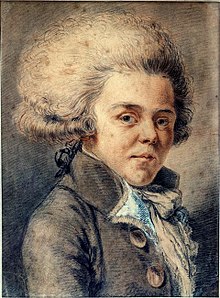Antoine de Rivarol
Antoine de Rivarol (born June 26, 1753 in Bagnols-sur-Cèze , † April 13, 1801 in Berlin ) was a French writer.
Life
The man of letters, once known throughout Europe, came from a rather petty-bourgeois family of Italian descent, but received a decent schooling because he was supposed to become a clergyman. After a brief interlude as a tutor in Lyon , he went to Paris in 1777 at the age of 24 , where he posed as the noble Chevalier de Parcieux.
He quickly showed himself to be a talented satirist , to whom several magazines opened up, e.g. B. the renowned Mercure de France . Above all, however, he proved to be a gifted salon animator, to whom hardly a door in the capital was locked. In the beginning he had problems with his false Chevalier title and even had to give it up, a few years later there was hardly any protest when he confidently called himself a Comte ( Count ).
Rivarol became famous all over Europe in 1784, at the age of just 30, when he won the Berlin Academy Prize with his Discours sur l'universalité de la langue française , in which, with these or that rational, but above all many pseudorational arguments, he followed the then in I tried to explain and legitimize the generally accepted primacy of French as the language of literature , science , court and diplomacy in Europe :
"Europe has acquired a power that is incomparable in history: the many capitals, the multitude and speed of its expeditions, public and private transport have made it a great republic that has to choose a language."
During the revolutionary years, Rivarol worked - like many writers - as a journalist , namely as a monarchist and defender of the conditions of the ancien régime . In 1792 he gave way to the pressure of the revolutionary forces and fled, first to Brussels , which was then Austrian , then to London in 1794 and to Hamburg in 1795 , a stronghold of French emigration . In 1800 he visited Berlin and had another party there.
In France, Napoleon Bonaparte had come to power in the meantime and built golden bridges for the emigrants because he needed officers and administrative officials for the areas occupied by French troops. Rivarol died shortly before his planned return to France. He was buried in the Dorotheenstädtischer Friedhof in Berlin, but his grave was soon forgotten.
Works
-
Memoires de Rivarol. 1824
- German: Political journal of a royalist: May 5 to October 5, 1789. Ed. Johannes Willms . Athenaeum, Bodenheim 1989, ISBN 3-610-08521-5
- From people. Thoughts and maxims. Portraits and bon mots. Anthology. Ed., Translated by Ulrich Kunzmann. Matthes & Seitz , Berlin 2012, ISBN 978-3-88221-740-7
- Übers. Beate Thill: About the universality of the French language. Forward Dany Laferrière . Wunderhorn, Heidelberg 2017 (French 1783)
literature
- Ernst Jünger : Rivarol , Klett-Cotta
- Jürgen Storost : 300 years of Romance languages and literatures at the Berlin Academy of Sciences . Peter Lang, Frankfurt 2008, part 1, pp. 138–146
Web links
- Literature by and about Antoine de Rivarol in the catalog of the German National Library
Individual evidence
- ↑ in German: 2017
- ^ Ernst Jünger , Rivarol, 1956 ( books.google.de ); Deadly punchlines shimmer through the Parisian salons , Wolf Lepenies , Die Welt , August 4, 2012
| personal data | |
|---|---|
| SURNAME | Rivarol, Antoine de |
| BRIEF DESCRIPTION | French author |
| DATE OF BIRTH | June 26, 1753 |
| PLACE OF BIRTH | Bagnols-sur-Cèze |
| DATE OF DEATH | April 13, 1801 |
| Place of death | Berlin |
